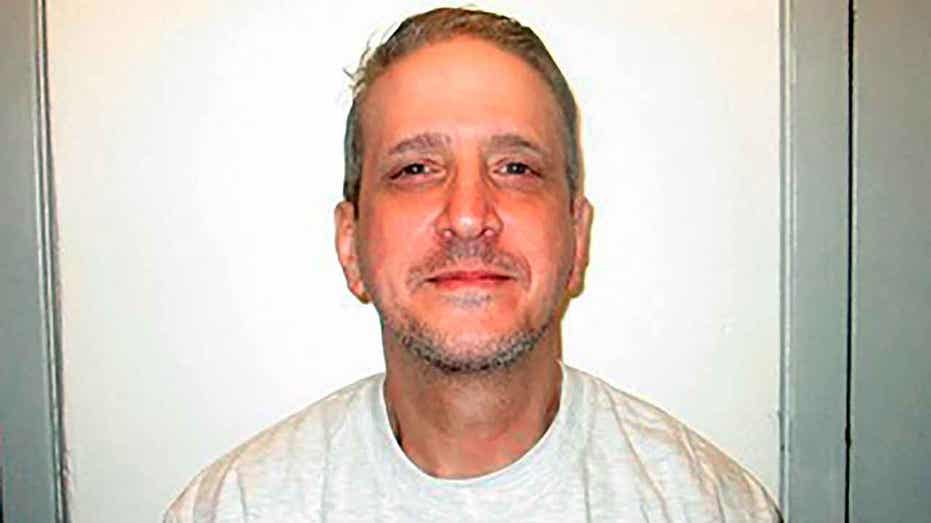Supreme Court tosses conviction and death sentence of Oklahoma inmate, orders new trial

The Supreme Court has tossed out the murder conviction and death sentence of Oklahoma’s Richard Glossip, ordering a new trial. Glossip was convicted and sentenced to death in the 1997 killing in Oklahoma City of his former boss, motel owner Barry Van Treese, in what prosecutors have alleged was a murder-for-hire scheme. Prosecutors in Oklahoma twice convinced separate juries to send him to death row. The justices heard arguments in October in a case that produced a rare alliance in which lawyers for Glossip and the state argued that the high court should overturn Glossip’s conviction and death sentence because he did not get a fair trial. “We conclude that the prosecution violated its constitutional obligation to correct false testimony,” Justice Sonia Sotomayor wrote in a majority opinion. SOUTH CAROLINA DEATH ROW INMATE CHOOSES FIRING SQUAD AS EXECUTION METHOD “The Court stretches the law at every turn to rule in his favor. At the threshold, it concocts federal jurisdiction by misreading the decision below. On the merits, it finds a due process violation based on patently immaterial testimony about a witness’s medical condition,” Justice Clarence Thomas wrote in a dissenting opinion. “And, for the remedy, it orders a new trial in violation of black-letter law on this Court’s power to review state-court judgments.” At issue was whether Glossip’s constitutional rights were violated when possibly exculpatory evidence was not turned over to his lawyers at trial. And whether Oklahoma’s highest criminal court should have upheld the conviction and sentence, even after that new evidence came to light. The case against Glossip, now 62, essentially rested on the testimony of Justin Sneed, in what prosecutors had originally said was a murder for hire. The state claimed Glossip, who was employed at the Best Budget Inn, hired co-worker Sneed for $10,000 to kill their boss. The motive– Glossip allegedly feared he would be fired for skimming money from the business. Sneed later admitted to beating Van Treese to death with a baseball bat and received a life sentence in exchange for his testimony. JUDGE REJECTS REQUEST FROM GEORGIA DEATH ROW INMATE TO BE EXECUTED BY FIRING SQUAD In 2023, Republican Oklahoma Attorney General Gentner Drummond ordered an outside independent review of Glossip’s case. Drummond, citing “troubling evidence of grave prosecutorial misconduct,” then formally “confessed error” by the state, and said Glossip deserved a new trial. Among Drummond’s concerns are that prosecutors knew Sneed lied on the witness stand about his psychiatric condition and his reason for taking the mood-stabilizing drug lithium. Drummond also has cited a box of evidence in the case that was destroyed, including motel receipts, a shower curtain and masking tape that Glossip’s attorney, Don Knight, said could have potentially proven Glossip’s innocence. Glossip has always maintained his innocence. He was initially convicted in 1998 but won a new trial ordered by a state appeals court. He was convicted again in 2004. Meanwhile, the victim’s relatives had told the Supreme Court that they wanted to see Glossip executed. If Glossip were to be tried again, the death penalty would be off the table, Oklahoma County District Attorney Vicki Zemp Behenna has said. Then as now, the state still believes Glossip may be at least guilty of aiding and abetting a crime after the fact, which would not mean a death sentence. Fox News’ Shannon Bream and the Associated Press contributed to this report.
SCOOP: FCC to brief lawmakers on George Soros investigation in closed-door meeting

EXCLUSIVE: House Republicans are getting an update on the Trump administration’s probe of billionaire George Soros’ influence on local radio, a source familiar with planning told Fox News Digital. The Republican Study Committee (RSC), the 175-strong caucus led by Rep. August Pfluger, R-Texas, is hosting Federal Communications Commission (FCC) Chairman Brendan Carr at its annual closed-door lunch on Wednesday. The source familiar with the planning said Carr is expected to brief GOP lawmakers on the FCC’s investigation into Soros, including an investment firm he’s linked to purchasing over 200 Audacy radio stations nationwide. Carr and Republicans are also expected to more widely discuss strategies for pushing back against media deemed to be biased against the GOP. KEY CONSERVATIVE CAUCUS DRAWS RED LINE ON HOUSE BUDGET PLAN The RSC is the largest grouping of lawmakers within the House GOP and traditionally acts as an informal think tank for the conference. It has also been a conduit for several top Trump administration officials to Capitol Hill so far this year. Deputy Chief of Staff Stephen Miller addressed the RSC on immigration and President Donald Trump’s plan for executive action last month. Earlier in February, the group heard from Energy Secretary Chris Wright. NONCITIZEN VOTER CRACKDOWN LED BY GOP AHEAD OF 2026 MIDTERMS An investment firm linked to Soros, a left-wing businessman who has sunk billions of dollars into liberal causes, became the largest stakeholder in radio giant Audacy at the tail end of the Biden administration late last year. The Soros Investment Fund acquired roughly 40% of Audacy’s debts after the company filed for Chapter 11 bankruptcy. Republican lawmakers blasted the deal, including Rep. Chip Roy, R-Texas, and Sen. John Kennedy, R-La., both of whom called for intense scrutiny. Carr signaled he wanted to set his sights on Soros late last year during an interview on “Mornings with Maria.” “There’s a petition for reconsideration pending at the FCC right now. And I want to take a very hard look at that,” he said in late November. Fox News Digital reached out to the FCC and Audacy for comment.
Liberal judge recruits sanctuary sheriffs who defied ICE for ad touting crime record in pivotal race

In an ad promoting herself as a tough on crime judge, and her opponent as “too extreme,” the Democrat-aligned candidate in the Wisconsin Supreme Court race touted the endorsement of a local sheriff who has a long history of promoting sanctuary immigration policies and opposing Immigration and Customs Enforcement (ICE). “Take it from a sheriff,” Dane County Sheriff Kalvin Barrett said in a recent 15-second ad, paid for by candidate Susan Crawford, criticizing the Republican-aligned candidate Brad Schimel of being too “extreme” for the Wisconsin Supreme Court and for “letting rapists walk free” in a claim involving a backlog of rape kits being processed that Schimel has pushed back on. Barrett has faced his own share of criticism for policies labeled soft on crime, specifically on illegal immigrant crime, where his office has a history of refusing to cooperate with ICE. Earlier this year, Barrett withdrew Wisconsin from the State Criminal Alien Assistance Program that ICE uses to locate criminal illegal immigrants in jail, which earned him praise from the ACLU. TOM HOMAN TELLS MIGRANT TERROR GROUPS TRUMP WILL ‘WIPE YOU OFF THE FACE OF THE EARTH’ “At this point, we will no longer be taking part in the SCAAP grant program, and it is due to the recent change in administration and our understanding, listening, and hearing our community here in Dane County,” Barrett told Channel 3000 at the time. Barrett has also pledged that his department will “not be proactively involved in any sort of round-ups, any sort of immigration enforcement.” ICE listed Dane County as a jurisdiction that was “non-cooperative” in a June 2024 report, as Barrett’s office released individuals suspected of being illegal immigrants out on bail after committing crimes that were in some cases violent. In 2024, two Republican congressmen in Wisconsin released a statement demanding answers from Barrett on Alejandro Jose Coronel Zarate, a suspected member of the Venezuelan street gang Tren de Aragua, having a warrant for his arrest in Dane County when he was then arrested for allegedly sexually and physically assaulting a woman and her child. BRETT FAVRE HAS 1-WORD RESPONSE TO WISCONSIN GOV’S PROPOSAL THAT WOULD REPLACE WORD ‘MOTHER’ IN STATE LAW “Sanctuary policies undermine both the rule of law and the safety of American communities,” Matt O’Brien, director of investigations at the Immigration Reform Law Institute, told Fox News Digital. “To begin with, states, counties, and municipalities cannot simply ignore any federal laws they dislike. But that’s exactly what sanctuary jurisdictions are doing.” “Secondly, law enforcement officials who are tough on crime and serious about protecting their communities seize every available opportunity to neutralize threats to public safety. Police chiefs and sheriffs in sanctuary jurisdictions actually do the exact opposite. They shield foreign criminals from federal immigration enforcement. And, in so doing, they encourage criminals to take up residence in the very communities they are responsible for protecting. Simply put, it is impossible to be a sanctuary police chief or sheriff and be tough on crime – because the very essence of being a sanctuary jurisdiction is giving preferential treatment to illegal alien bad guys.” Another sheriff featured in the ad, former Dane County Sheriff David Mahoney, has also publicly pushed back against ICE raids. Schimel, who has been endorsed by over 80 Wisconsin sheriffs and previously served as the state’s attorney general, will face Crawford in an election on April 1 for a 10-year term on the state’s supreme court to replace retiring Judge Ann Walsh Bradley. Although the Supreme Court seats are considered nonpartisan, Crawford, currently a circuit court judge, has earned the endorsement of the Wisconsin Democratic Party, which received $1 million from George Soros in January before then sending $2 million to Crawford and various liberal activist groups. Schimel, currently a Waukesha County judge, has the backing of the Wisconsin GOP, several top Republican donors, including Chicago Cubs co-owner Joe Ricketts and Elon Musk’s Building America’s Future PAC. MUSK’S DEMAND THAT FED EMPLOYEES LIST THEIR ACCOMPLISHMENTS ROILS WORKFORCE: ‘MASS CIVIL DISOBEDIENCE’ The race is expected to have significant implications on the future of Wisconsin politics given that the court’s current 4-3 liberal majority would essentially be set in stone through 2028 or, if Schimel were to win, become a conservative-leaning court with Justice Brian Hagedorn serving as a key swing vote. “In November, Wisconsin voters chose common sense above a far-left agenda. Now, Dangerous Democrat Susan Crawford, wants to be a liberal activist from the bench of the Wisconsin Supreme Court. Crawford and Democrats are already plotting to redraw Congressional seats to attack President Trump’s America First Agenda,” Wisconsin GOP Executive Director Andrew Iverson told Fox News Digital in a statement. “While Brad Schimel has a record of protecting Wisconsin’s most vulnerable, Crawford has a record of coddling criminals and has attached herself at the hip with anti-ICE and defund-police Democrats. On April 1, Wisconsin voters will flock to the ballot box to vote for Schimel — to save Wisconsin and save America.” In a statement to Fox News Digital, Schimel campaign spokesperson Jacob Fischer said, “Susan Crawford is backed by George Soros, and she’s not trying to hide it.” “If Crawford wins, she would continue to force-feed us her dangerous, Soros-backed agenda. We must stop her from destroying Wisconsin.” Fox News Digital reached out to both Barrett and Crawford for comment but did not receive a response.
Shuttered NYC migrant shelter highlights Trump’s successful immigration clampdown: NY lawmaker

President Donald Trump’s quick work to crack down on illegal immigration has already paid off in the nation’s largest city, according to a New York State lawmaker. “This is a victory for taxpayers and a disaster for the progressives that have set up policies that have hurt New Yorkers,” Republican New York Assemblyman Jake Blumencranz told Fox News Digital in reaction to New York Mayor Eric Adams’ announcement on Monday that the Roosevelt Hotel migrant shelter in Manhattan will be shutting down in the next few months. The hotel, which was converted into a migrant shelter with about 1,000 rooms, has processed over 173,000 migrants since May 2023, a response to the wave of migrants that began coming to the city in 2022 in search of asylum. The Roosevelt Hotel’s shelter, along with the Humanitarian Emergency Response and Relief Center located on the site, will now be closed by June, a source told the New York Post. MAYOR ERIC ADAMS SAYS NYC’S ROOSEVELT HOTEL MIGRANT SHELTER WILL SOON CLOSE “While we’re not done caring for those who come into our care, today marks another milestone in demonstrating the immense progress we have achieved in turning the corner on an unprecedented international humanitarian effort,” Adams said in a statement. Adams also touted how his administration “skillfully managed the crisis,” in part thanks to “sound policy decisions” and the ability to continue helping “asylum seekers take the next steps in their journeys as they envision an even brighter future.” However, Blumencranz believes much of the credit should go to Trump, whose executive actions on immigration have stemmed the flow entering the country and New York City. “We’re not seeing the same volume of numbers as we saw during the Biden administration,” Blumencranz said. Blumencranz believes that even Democrats were caught off guard by the “sheer volume” of migrants entering the country as a result of the policies of the Biden administration, but the strain of the pressure on cities like New York has begun to alleviate with the new administration. “We’re finally seeing some sort of rescue to that problem,” Blumencranz said. NYC SUES AFTER TRUMP ADMINISTRATION CLAWS BACK $80 MILLION MIGRANT HOUSING GRANT Adams highlighted as much in his statement, noting that “there are currently fewer than 45,000 migrants in the city’s care, down from a high of 69,000 in January of 2024 and out of the more than 232,000 that have arrived in New York City seeking city services since the spring of 2022.” Blumencranz now believes it is time for judicial reforms aimed at removing criminals who have entered the country and New York City over the last few years. “What we need to see now is a system in place that reforms the judicial process, that we can make sure that those 60,000 some odd individuals who have come here and committed crimes are removed,” he said. “That needs to be step one.” Nevertheless, Blumencranz viewed the closure of the Roosevelt shelter as a positive start, representing a “realignment” of thinking among government leaders on how to better manage the crisis. Still, there is more work to be done to reassure New Yorkers who have seen the handling of the crisis stretch tax dollars thin and threaten government services. “Our state budget has ballooned to $250 billion, the largest in state history and one of the largest in the United States of America, more than most countries,” Blumencranz said. “What we’re seeing is a continuation of services being cut because we’re dealing with prices that are created through bad policies from the state legislature and from City Hall. It’s time we start to put our money where our mouth is, fully fund programs that matter to taxpayers, and stop playing this game where compassionate services should matter more than making sure your kids get a world class education when you’re paying top dollar to live here in New York.”
LGBT Americans reach record number, more likely to be Dems, Gen Z: Gallup poll

The percentage of Americans identifying as LGBT has risen to record highs, especially among Generation Z, a new Gallup poll released on Thursday shows, but that trend could see a departure under President Donald Trump, according to one expert, as the administration pushes back against gender treatments for minors. The poll found that 23% of Generation Z Americans, those born between 1997 and 2006, identify as lesbian, gay, bisexual or transgender. For comparison, 14.2% of millennials, those born between 1981 and 1996, identify the same way. Both groups identify as non-heterosexual compared to older generations, like Generation X and “Baby Boomers.” The Gallup poll surveyed more than 14,000 U.S. adults last year – collected through phone interviews with adults 18 and older – and found that 9.3% identify as lesbian, gay, bisexual, transgender or another non-heterosexual identity. This marks a significant increase from 2020, when the figure was about half that, and a sharp rise from 2012, when Gallup first started tracking sexual orientation and gender identity, recording only 3.5%. LGBT ACTIVISTS MOBILIZE TO CHALLENGE TRUMP’S ‘EXTREME GENDER IDEOLOGY’ EXECUTIVE ORDERS “The rate of LGBTQ+ identification is likely to continue to grow, given the generational shifts underway,” Gallup senior editor and researcher Jeffrey M. Jones wrote in the study. “One reason for higher LGBTQ+ identification among younger generations of adults is that they are much more likely to consider themselves bisexual than are older people,” Jones wrote. The study also found differences among those with political ideologies, as people identifying as LGBT were more likely to be female, liberal, White, and live in urban areas. Among them, 21% identified as liberal, 8% as moderate, and 3% as conservative. The rate of LGBT identification has nearly tripled over more than a decade, with a growing number of Americans in their teens, 20s and 30s identifying as bisexual, particularly more women compared to men, researchers noted. TRUMP SIGNS EXECUTIVE ORDERS BANNING ‘RADICAL GENDER IDEOLOGY,’ DEI INITIATIVES IN THE MILITARY However, Heritage Foundation senior legal fellow Sarah Parshall Perry said the findings are a snapshot in time – due to the “onslaught” of the Biden administration’s rulings on sex and gender over the last four years– but will likely begin to reverse under the Trump administration’s crackdown on transgender medical procedures for minors. “I think now that we’re seeing this return to common sense, we are going to see fewer and fewer young people begin to identify as LGBTQ,” Perry told Fox News Digital in an interview. “I would be very curious what the numbers look like four years into the future, after some of these policies have trickled down to the granular level.” “It was entirely unsurprising to me that it was the Generation Z who experienced the most precipitous increase, because they are the younger ones they are currently, right now, in the throes of sort of this battle between reality and cultural conformity,” Perry said. “That’s exactly where these kids are, and I think it’s exactly why we’re seeing these level of increases.” While the poll found 85.7% of respondents identified as straight, 5.2% identified as bisexual, 2.0% as gay, 1.4% as lesbian and 1.3% as transgender. Fewer than 1% of participants identified with other non-traditional LGBT labels, including pansexual, asexual or queer. Five percent of respondents declined to answer. FEDERAL JUDGE HALTS PLANNED MOVE OF TRANS INMATES TO FACILITIES FOR THEIR BIOLOGICAL SEX Trump has signed a slew of gender-related executive orders during his first 100 days in office which have already racked up multiple lawsuits. One of those orders, “Defending Women from Gender Ideology Extremism and Restoring Biological Truth to the Federal Government,” mandates that federal agencies recognize gender strictly as male or female, based on biological sex, and prohibits the use of gender pronouns on federal documents. It also directs agencies to cease funding for transgender medical treatments for transgender federal inmates and to remove policies promoting radical “gender ideology.”
New bill threatens to cripple ‘judicial tyranny’ from derailing Trump’s agenda at every turn

FIRST ON FOX: GOP Rep. Darrell Issa has introduced a bill aimed at preventing federal judges from issuing nationwide injunctions with the sole purpose of derailing a president’s political agenda, which Issa says has been the case since President Donald Trump was sworn in. The legislation, known as the No Rogue Rulings Act (NORRA), amends Chapter 85 of title 28, United 5 States Code by adding a “Limitation on authority to provide injunctive relief.” “Notwithstanding any other provision of law, no United States district court shall issue any order providing for injunctive relief, except in the case of such an order that is applicable only to limit the actions of a party to the case before such district court with respect to the party seeking injunctive relief from such district court,” the legislation states. Dozens of activist and legal groups, elected officials, local jurisdictions and individuals have launched more than 50 lawsuits against the Trump administration since Jan. 20 in response to his more than 60 executive orders, as well as executive proclamations and memos, Fox News Digital reported earlier this month. LAWSUIT TRACKER: NEW RESISTANCE BATTLING TRUMP’S SECOND TERM THROUGH ONSLAUGHT OF LAWSUITS TAKING AIM AT EOS Issa says NORRA would limit the scope of nationwide injunctions by preventing federal judges from issuing injunctions that extend beyond parties directly involved in a case, while also ensuring that any injunction restricts only the specific parties requesting relief, regardless of whether the injunction involves outright enforcement of actions or policy actions. “The founders could never have envisioned judges and part of the legislative branch teaming up to tie down the executive and disempower the people,” Issa told Fox News Digital, adding that the current judge-shopping climate in the United States amounts to “judicial tyranny” and a “weaponization of courts.” Issa’s office told Fox News Digital they are optimistic that this is a bill that will pass through Congress with Republican support and be signed by President Trump, adding that the bill has “maximum momentum.” DEMS LIKELY TO ‘WASTE MILLIONS’ ON DELUGE OF LAWSUITS BUT COULD COST TRUMP PRECIOUS TIME: EXPERT “Nowhere in our Constitution is a single federal judge given absolute power over the President or the people of the United States,” Issa posted on X last week. Issa’s bill comes as the Trump administration has publicly pushed back against the flurry of injunctions from courts across the country. “Many outlets in this room have been fear mongering the American people into believing there is a constitutional crisis taking place here at the White House,” White House press secretary Karoline Leavitt said during a press briefing last week. “I’ve been hearing those words a lot lately, but in fact, the real constitutional crisis is taking place within our judicial branch, where district court judges in liberal districts across the country are abusing their power to unilaterally block President Trump’s basic executive authority.” “We believe these judges are acting as judicial activists rather than honest arbiters of the law and they have issued at least 12 injunctions against this administration in the past 14 days, often without citing any evidence or grounds for their lawsuits,” she continued. “This is part of a larger concerted effort by Democrat activists, and nothing more than the continuation of the weaponization of justice against President Trump.”
The lived experiences of communism should serve as a cautionary tale

In Sunday’s general elections in Germany, the far-right Alternative for Germany (AfD) came second for the first time since World War II. Its electoral success is part of a Europe-wide trend of far-right resurgence that has worried many. As a university lecturer, I have observed that as a reaction to this phenomenon, many young people are becoming interested in far-left ideologies, such as communism. Students study Karl Marx as a key political thinker and often admire the old ideas of Marxism and the writings of other communist ideologues for their critique of class relations and capitalism. As young people engage with these ideologies, it is important for them to be aware that they did not remain just theories. Communism was applied as a political ideology of the Marxist-Leninist parties in dozens of countries in Europe and Asia, which resulted in repressive totalitarian regimes. The communist regime in my country, Czechia, which in the 1940s was part of an entity called Czechoslovakia, has left a horrific legacy. Today, on the 77th anniversary of the election that brought the communists to power in Prague, I cannot help but think about how the regime scarred the lives of many families, including my own. Advertisement I was born soon after the 1989 Velvet Revolution and grew up hearing about what it was like to live under communism for Czechoslovaks. It was a bleak and oppressive world in which the nationalisation of the means of production in reality meant stealing factories and homes from wealthier citizens so that the state could turn them into farmhouses or residences for top communist state officials. The concepts of fair elections and freedom of speech were mere dreams. In that world, individuals’ opportunities to study, travel, or secure good jobs were often determined by their “unblemished political profile” rather than their abilities. As a result, it was common to find qualified people who disagreed with the regime working in poorly paid and stigmatised jobs, while active members of the Communist Party, despite poor academic performance or lack of experience, occupied top positions. “This all became normal for us. No one believed the totalitarian regime would fall,” my mother told me recently. Those who disagreed with or confronted the regime paid a heavy price. There are many accounts in academia and the media of the brutal practices of the State Security (StB) directed at Czechoslovak citizens deemed “enemies of the state”: mass surveillance, blackmail, arrests, torture, execution, and forced emigration. The stories of high-profile dissidents, such as the executed lawyer Milada Horakova or the imprisoned writer Vaclav Havel, who became the first democratically elected Czech president, are well known. Advertisement But there are many other stories of people who faced repression that remain unknown to the public. The Institute for the Study of Totalitarian Regimes has documented the cases of about 200,000 people arrested in communist Czechoslovakia due to their social class, status, opinions, or religious beliefs. Of these, 4,495 died during their time in prison. My father belongs to this mass of prisoners who are largely unknown. He was labelled “dangerous to communist society” in 1977 and sentenced to 18 months in prison. When I was in my 20s, I found an old, yellowed paper file hidden in a drawer of the living room table, with the title “Verdict in the Name of the Czechoslovak Socialist Republic”. The fading typewritten text revealed that my father, along with his friend, was found guilty of avoiding military service and spreading negative political opinions. My father strongly disagreed with the Communist Party leading the country, and he refused to serve in the army because it had failed in its primary duty to protect the country and its civilians during the Warsaw Pact invasion of Czechoslovakia in 1968. In the summer of that year, 200,000 soldiers from the Soviet Union and other communist European countries invaded to suppress the democratic reform movement that was emerging – what came to be known as the Prague Spring. By the end of the year, 137 Czechs and Slovaks were killed. To maintain control in Prague, the Soviet Union permanently stationed troops as an occupying force in the country. Until they withdrew in 1991, Soviet soldiers killed 400 people and raped hundreds of women. Advertisement Despite the brutal violence and crimes, the Communist Party still considered the Warsaw Pact armies to be Czechoslovakia’s allies. So the court condemned my father for “being against the Communist Party and society, damaging relations between the Czechoslovak Army and the Warsaw Pact forces due to his selfish reasons, and being a huge disappointment, given his promising working-class background”. He was just 22 years old and was about to get married to my mother. When I asked my father about the document and his time in prison, he fell silent. Only my mother shared a few insights: “I was heavily pregnant and lost the baby. Your dad came to see me at the hospital and said he would be leaving for work for some time. Later, I found out he was in prison.” My mother sent my father dozens of letters, but the prison guards did not deliver them. She tried to visit him several times but was not allowed to see him. She would wait outside the prison, hoping to catch a glimpse of him when the prisoners returned from their forced labour. “I saw him once for a few seconds. He was just a thin figure with no hair. He looked exhausted. We waved at each other,” my mother recalled. My father was released after 10 months for good behaviour. Recently, I finally managed to persuade my father to visit, with me, the National Security Archive in Prague. We hoped to find more information about who had led his case and who had spied on him – perhaps a friend or even a family member? To our disappointment, the staff handed us a thin file with a note: “The majority of the documents with your father’s name were destroyed by the State Security.”
Ukraine reconstruction costs cross half-trillion-dollar mark: Report

The $524bn estimate marks growing needs provoked by Russia’s bombardment of Ukrainian cities and infrastructure as the war moves into a fourth year. The estimated cost of reconstructing Ukraine has risen to more than half a trillion US dollars, according to a new report. The cost of rebuilding the country and reviving its economy has risen to $524bn currently, predicted a study by the World Bank, United Nations, European Commission (EC) and Ukrainian government that was released on Tuesday. The total is nearly three times Ukraine’s expected 2024 economic output. The estimate marks an increase of more than 7 percent compared with the institutions’ last report, which pitched the cost at $486bn a year ago. The data, which covers damages incurred from the date of Russia’s full-scale invasion on February 24, 2022 to December 31, 2024, quantified the direct physical damage to buildings and other infrastructure, the effect on people’s lives and livelihoods, and the cost to “build back better”, the institutions said in a joint press release. Housing, transport, energy, commerce and education were the most affected sectors. This included a 70 percent increase in damages to Ukraine’s energy infrastructure from Russian attacks. Advertisement About 13 percent of Ukraine’s total housing stock has been damaged or destroyed, affecting more than 2.5 million households. The housing sector accounts for about $84bn of the total long-term needs, followed by transport at almost $78bn, energy and mining at close to $68bn, commerce and industry at more than $64bn, and agriculture, which has needs of $55bn. The cost of debris clearance and management alone is pegged at almost $13bn, the report said. The estimate excluded more than $13bn in needs across eight sectors that have already been met by Ukraine through the state budget and donor funds. EC Commissioner for Enlargement Marta Kos said “the assessment highlights the extraordinary damage Russia has inflicted on Ukraine” and stressed that Ukraine’s economy must be integrated deeper into the EU single market to facilitate recovery. Ukrainian Prime Minister Denys Shmyhal said “recovery needs have continued to grow due to Russia’s ongoing attacks,” adding that his government would prioritise rebuilding and repairing energy infrastructure and housing. Daily air attacks Ukraine marked three years of all-out war with Russia on Monday, with the two countries now swapping almost daily drone and missile attacks, many hitting vital infrastructure. Air alerts were sounded across the whole of Ukraine early on Tuesday, as the air force warned of a huge spate of missile attacks. The Ukrainian military said Russia launched seven missiles and 213 drones overnight. The airforce said it shot down six missiles and 133 drones, while another 79 drones did not reach their targets, likely due to electronic warfare. Advertisement A 44-year-old woman was injured and several houses damaged in the Kyiv region, Governor Mykola Kalashnyk said. Amid the barrage, neighbouring Poland – a NATO member and base for planes belonging to allies in the military alliance – said it had scrambled aircraft to ensure its security. Russia’s Ministry of Defence said air defence units intercepted and destroyed 19 Ukrainian drones overnight. Adblock test (Why?)
Music stars release silent album in protest against UK AI copyright plans

Is This What We Want features recordings of empty studios, performance spaces, highlighting danger to creative trade. More than 1,000 musicians, including Kate Bush, Cat Stevens and Annie Lennox, have released a silent album in protest of the proposed changes to British copyright laws around artificial intelligence (AI), which they warned could lead to legalised music theft. The album, titled Is This What We Want, was launched on Tuesday and features recordings of empty studios and performance spaces, as backlash against the plan grows in the United Kingdom. The proposed changes would allow AI developers to train their models on any material to which they have lawful access, and would require creators to proactively opt out to stop their work from being used. Critics, including the artists participating in the silent album, say it would reverse the principle of copyright law, which grants exclusive control to creators over their work. The emergence of AI has posed a threat to the creative industry, including music, raising legal and ethical questions on a new technological platform that could produce its own output without paying creators of original content. Advertisement Bush and other writers and musicians denounced the proposals in UK law as a “wholesale giveaway” to Silicon Valley in a letter to The Times newspaper. Ed Newton-Rex, organiser of the project, said musicians were “united in their thorough condemnation of this ill-thought-through plan”. In a very rare move, UK newspapers also highlighted their concerns, launching a campaign featuring wrap-around advertisements on the front of almost every national daily, with an inside editorial by the papers’ editors. A public consultation on the legal changes will close later on Tuesday. British Prime Minister Keir Starmer wants to become a superpower in the AI industry. Responding to the album, a government spokesperson said the current copyright and AI regime was holding back the creative industries from “realising their full potential”. Adblock test (Why?)
Trump tax cut plan heads for House-wide vote despite GOP rebel threats, Medicaid anxiety

House Republicans’ mammoth budget resolution survived its final hurdle late Monday night before heading for a chamber-wide vote. The legislation passed the House Rules Committee on a party-line vote in a measure combining several bills that are expected to get a full House vote this week. House GOP leaders aim to have it pass on Tuesday evening, Fox News Digital was told, but various concerns about spending cut levels could put that goal out of reach. Under the current margins, House Speaker Mike Johnson, R-La., can only lose one Republican vote to pass a bill without Democrats. KEY CONSERVATIVE CAUCUS DRAWS RED LINE ON HOUSE BUDGET PLAN Rep. Victoria Spartz, R-Ind., announced over the weekend that she is against the current text, while several other fiscal hawks suggested their support is still up in the air. Two other conservatives, Reps. Tim Burchett, R-Tenn., and Thomas Massie, R-Ky., signaled they would oppose the resolution as well. Some Republicans are worried about potentially damaging cuts to Medicaid and other federal benefit programs that their constituents rely on. Johnson met with some of those potential holdouts on Monday night for what he called a “very productive conversation.” The speaker sounded optimistic leaving the Capitol late on Monday, telling reporters, “We’re on track. We got the resolution through rules, and we’re expecting to vote tomorrow evening.” The bill aims to increase spending on border security, the judiciary and defense by roughly $300 billion, while seeking at least $1.5 trillion to $2 trillion in spending cuts elsewhere. As written, the bill also provides $4.5 trillion to extend President Donald Trump’s 2017 Tax Cuts and Jobs Act (TCJA) provisions, which expire at the end of this year. An amendment negotiated by House Budget Committee Chairman Jodey Arrington, R-Texas, and conservatives on his panel would also force lawmakers to make $2 trillion in cuts, or else risk the $4.5 trillion for Trump’s tax cuts getting reduced by the difference. That agreement alarmed Republicans on the House Ways & Means Committee, like Rep. Nicole Malliotakis, R-N.Y. “I don’t think that is doable without affecting beneficiaries, and I’ve expressed that concern to leadership and in talking to some of my colleagues,” Malliotakis told Fox News Digital last week. Johnson met with Malliotakis and other members of the Congressional Hispanic Conference, a House GOP group, on Monday night to discuss their concerns about spending cuts in the bill. The New York Republican was more optimistic when leaving the meeting late on Monday night, telling reporters that GOP leaders had eased her concerns. “I’d say now I’ve shifted from undecided to lean yes,” Malliotakis told reporters. “This is moving in the right direction.” GOP lawmakers are working to pass a broad swath of Trump policies – from investments in defense and border security to eliminating taxes on tipped and overtime wages – via the budget reconciliation process. BLACK CAUCUS CHAIR ACCUSES TRUMP OF ‘PURGE’ OF ‘MINORITY’ FEDERAL WORKERS The mechanism allows the party in control of both houses of Congress to pass a tax and budget bill without help from the opposing party. To do so, it lowers the threshold for passage in the Senate from two-thirds to a simple majority, where the House already sits. The Senate advanced a narrower version of the plan last week, which does not include Trump’s tax cut priorities. Because the president favors all of the issues being wrapped up into one bill, however, it’s been relegated to a de facto backup plan if the House fails to pass its plan on a reasonable timeline. The House Rules Committee is the final gatekeeper for most pieces of legislation before a chamber-wide vote. The committee will normally debate a set of bills, not necessarily related ones, before setting terms for amendments and debate and advancing those terms out of committee as a single “rules package.” House lawmakers will then vote on the rules package before the final reconciliation framework. Once this bill passes the House, the relevant committees will get to work filling the framework out with detailed policy priorities, which will then be returned as a final bill that will need to face House passage again. Johnson said at the Americans for Prosperity event Monday that he wants that to happen sometime in April.

